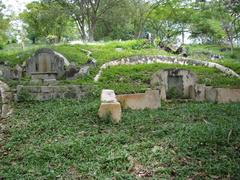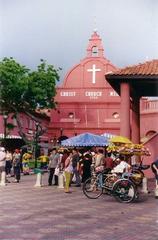Kampung Kling Mosque: Visiting Hours, Tickets, and Historical Significance in Malacca
Date: 15/06/2025
Introduction
Kampung Kling Mosque in Malacca, Malaysia, stands as a living testament to the city’s rich history of multiculturalism and religious harmony. Founded in 1748 by Indian Muslim traders, this mosque is one of the oldest in the region and represents the cosmopolitan legacy of Malacca—a city shaped by centuries of trade and cultural exchange. Its distinctive architecture is an extraordinary blend of Sumatran, Chinese, Hindu, and Malay influences, reflecting the pluralistic spirit that defines Malaysia today (Wikipedia; Visit Melaka).
Located on Jalan Tukang Emas, more famously known as “Harmony Street,” the mosque shares its neighborhood with the Cheng Hoon Teng Chinese Temple and the Sri Poyatha Moorthi Hindu Temple, making it an essential stop for visitors hoping to experience Malacca’s unique tapestry of faiths (Wanderboat). This comprehensive guide will explore its fascinating history, architectural features, practical visiting information, and travel tips to ensure you make the most of your visit.
Historical Background
Origins and Development
Kampung Kling Mosque, locally known as Masjid Kampung Kling (مسجد كامڤوڠ كليڠ), traces its origins to 1748. The original wooden structure was built by South Indian Muslim traders, with “Kling” being an old term for people from southern India (Wikipedia). In 1872, the mosque was reconstructed in brick, signifying the community’s permanence and prosperity.
Architectural Evolution and Multicultural Influences
The mosque’s architecture is a striking blend of Sumatran, Chinese, Hindu, and Malay styles (Travelfish). Its three-tiered Meru-style roof and pagoda-inspired minaret are reminiscent of Southeast Asian temples, while decorative elements draw from European, Chinese, and Indian traditions. Columns and arches display European influence, and the use of ceramics, Victorian chandeliers, and intricate wood carvings further highlight its eclectic roots (Thrillophilia).
Key Features
- Roof & Minaret: The three-tiered pyramid roof and Chinese pagoda-style minaret set the mosque apart from typical Middle Eastern-influenced mosques (TripXL).
- Interior: Features Portuguese glazed tiles, a Victorian chandelier, and a beautifully carved golden minbar.
- Courtyard: Contains a Baroque-style fountain and an ornate entrance arch.
- Symbolism: The roof tiers represent the relationship between humans, nature, and the divine (Travelfish).
Community Role and Preservation
Kampung Kling Mosque is more than a place of worship—it’s an educational and cultural hub for the local Muslim community. The mosque hosts religious classes, cultural events, and participates in interfaith dialogues (Thrillophilia). Ongoing restoration efforts, especially the major project completed in 1999, have preserved its unique character. Today, the mosque is protected under Malaysia’s National Antiquity Act and is included in the UNESCO World Heritage Site of the Historic Cities of the Straits of Malacca (Discover Malaysia UNESCO; Springer Link).
Visiting Information
Location & Accessibility
- Address: Jalan Tukang Emas, 75200 Malacca, Malaysia
- GPS: 2°11’48.69” N, 102°14’51.36” E
- Getting There: Walking distance from Jonker Walk and other heritage sites; accessible by local buses and taxis (Evendo).
Opening Hours
- Daily: 9:00 AM – 5:00 PM
- Friday Prayers: Limited visitor access from 12:00 PM – 2:00 PM
Entrance Fee
- Admission: Free for all visitors; donations are appreciated (Evendo).
Dress Code
- Men: Long pants and sleeved shirts
- Women: Long skirts/pants, sleeved tops, and headscarf (provided if needed)
- Shoes: Remove before entering the prayer hall
- Loaner Attire: Available on-site (Wanderboat)
Accessibility
- Wheelchair Access: Ramps at main entrance; some historical areas may have steps or uneven surfaces
- Facilities: Restrooms, water station, and fans for comfort
Visitor Etiquette
- Maintain quiet and respectful behavior, especially during prayers
- Photography is allowed in most areas, but always ask permission before photographing inside the prayer hall or worshippers
- Eating and drinking inside the mosque are not permitted
Best Times to Visit
- Weekdays: Less crowded than weekends
- Early Morning/Late Afternoon: Cooler temperatures and soft lighting for photography
- Avoid Prayer Times: Especially on Fridays
Nearby Attractions
Kampung Kling Mosque sits in the heart of Malacca’s heritage district, making it easy to combine your visit with other must-see sites:
- Cheng Hoon Teng Temple: Malaysia’s oldest Chinese temple
- Sri Poyatha Moorthi Hindu Temple: Malaysia’s oldest Hindu temple
- Jonker Walk: A lively street market for food and antiques
- A Famosa Fort and Dutch Square: Iconic colonial landmarks
Nearby, you’ll also find plenty of local dining options offering Malaysian and Nyonya cuisine (Wanderboat).
Guided Tours and Special Events
Guided tours can be arranged through local tour operators or the Malacca Tourism Office, providing deeper insight into the mosque’s history and architecture. The mosque also hosts community events and special activities during Islamic festivals, including communal prayers and iftar during Ramadan (Islamic Tourism Centre).
Notable Architectural Highlights
- Pagoda-style Minaret: A 25-meter structure with three receding tiers, featuring Chinese and Hindu influences (TripXL).
- Timber Columns & Wooden Carvings: Showcasing Malay craftsmanship and intricate motifs
- Ablution Pool & Courtyard: Reminiscent of Hindu temple tanks, complete with a Baroque-style fountain
- Victorian and Portuguese Tiles: Enhance the mosque’s interior, along with a grand Victorian chandelier
Visitor Tips
- Dress modestly and bring a hat or scarf for sun protection
- Engage with caretakers or locals for cultural insights
- Carry water and use sunscreen due to the tropical climate
- Visit nearby attractions on Harmony Street for a holistic experience of Malacca’s heritage
Frequently Asked Questions (FAQ)
Q: What are the visiting hours of Kampung Kling Mosque?
A: 9:00 AM to 5:00 PM daily; avoid visiting during prayer times, especially on Fridays.
Q: Is there an entrance fee?
A: No, visiting the mosque is free. Donations are welcome.
Q: Are guided tours available?
A: Yes, via local tour operators and the Malacca Tourism Office.
Q: Is the mosque wheelchair accessible?
A: Yes, though some areas may require assistance.
Q: Can I take photographs inside?
A: Generally yes, but ask permission in prayer areas and avoid disrupting worshippers.
Q: What is the dress code?
A: Modest attire is required; women should wear a headscarf (available on site).
Visuals and Media
- Use high-quality images of the mosque’s exterior, minaret, and interior details
- Suggested alt text: “Kampung Kling Mosque Malacca exterior,” “Meru-style mosque roof,” “Kampung Kling Mosque wooden carvings”
- Embed interactive maps to highlight Harmony Street and nearby attractions
Timeline of Key Events
- 1748: Original wooden structure built
- 1872: Rebuilt in brick with multicultural design elements
- 1999: Major restoration and declared a historical monument
- 2005: Protected under the National Antiquity Act
- 2008: Included in the UNESCO World Heritage Site
Conclusion
Kampung Kling Mosque is a testament to Malacca’s enduring spirit of religious tolerance and cultural fusion. Its unique blend of Sumatran, Chinese, Hindu, and Malay influences make it a must-visit for anyone interested in history, architecture, or Malaysia’s diverse cultural heritage. Whether you’re drawn by its architectural beauty or its role in the community, the mosque offers a rich, educational experience for all visitors.
Plan your visit today, explore the surrounding attractions on Harmony Street, and immerse yourself in the vibrant history of Malacca. For up-to-date travel tips and personalized recommendations, download the Audiala app and follow us on social media.
References
- Kampung Kling Mosque – Wikipedia
- Visit Melaka – Official Tourism
- Travelfish
- TripXL
- Wanderboat
- Wonderful Malaysia
- Thrillophilia
- Discover Malaysia UNESCO
- Springer Link
- Evendo
- Islamic Tourism Centre


